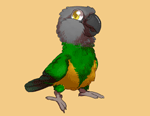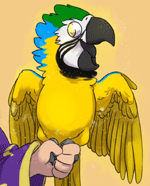 Kili
Type: Senegal Parrot
Genus: Poicephalus
Species: Senegalus
Subspecies: Mesotypus
Sex: Female
Weight: 120 grams
Height: 9 inches
Age: 17 years, 7 months
|
 Truman
Type: Cape Parrot
Genus: Poicephalus
Species:Robustus
Subspecies: Fuscicollis
Sex: Male
Weight: 330 grams
Height: 13 inches
Age: 15 years, 11 months
|
 Rachel
Type: Blue & Gold Macaw
Genus: Ara
Species:ararauna
Sex: Female
Weight: 850 grams
Height: 26 inches
Age: 13 years, 7 months
|
List of Common Parrots:
Parakeets:
Budgerigar (Budgie)
Alexandrine Parakeet
African Ringneck
Indian Ringneck
Monk Parakeet (Quaker Parrot)
Parrotlets:
Mexican Parrotlet
Green Rumped Parrotlet
Blue Winged Parrotlet
Spectacled Parrotlet
Dusky Billed Parrotlet
Pacific Parrotlet
Yellow Faced Parrotlet
Lovebirds:
Peach Faced Lovebird
Masked Lovebird
Fischer's Lovebird
Lilian's (Nyasa) Lovebird
Black Cheeked Lovebird
Madagascar Lovebird
Abyssinian Lovebird
Red Faced Lovebird
Swindern's Lovebird
Lories and Lorikeets:
Rainbow Lorikeet
Conures:
Sun Conure
Jenday Conure
Cherry Headed Conure
Blue Crowned Conure
Mitred Conure
Patagonian Conure
Green Cheeked Conure
Nanday Conure
Caiques:
Black Headed Caique
White Bellied Caique
Poicephalus Parrots:
Senegal Parrot
Meyer's Parrot
Red Bellied Parrot
Brown Headed Parrot
Jardine's Parrot
Cape Parrot
Ruppell's Parrot
Eclectus:
Eclectus Parrot
African Greys:
Congo African Grey (CAG)
Timneh African Grey (TAG)
Amazons:
Blue Fronted Amazon
Yellow Naped Amazon
Yellow Headed Amazon
Orange Winged Amazon
Yellow Crowned Amazon
Cockatoos:
Cockatiel
Galah (Rose Breasted) Cockatoo
Sulphur Crested Cockatoo
Umbrella Cockatoo
Moluccan Cockatoo
Bare Eyed Cockatoo
Goffin's Cockatoo
Macaws:
Red Shouldered (Hahn's) Macaw
Severe Macaw
Blue And Gold Macaw
Blue Throated Macaw
Military Macaw
Red Fronted Macaw
Scarlet Macaw
Green Winged Macaw
Hyacinth Macaw
Glossary of Common Parrot Terms
|
| | Tuesday November 20th, 2012 |
|
Hurricane Sandy was a wake up call for people in the northeast and a reminder to everyone that we are not invulnerable. Whether you live in a tornado, earthquake, flood, or other natural disaster prone region, it is important to be prepared. Even if you live in the safest possible region, other unforeseen problems such as fire, electrical outage, or medical emergency can still happen. Therefore we must all make sure that we are able to care for our pets even under extreme circumstances. The number of lost and abandoned pets from the recent hurricane is astounding as much as unacceptable. I would like to go over some things to consider in preparation for unforeseen circumstances and how it pertains to parrots. As difficult as it may be to deal with a disaster, it is even more difficult for us to keep our parrots safe because of their special needs.
I challenge you to consider a few of the following scenarios and play through in your head what you would do to deal with it. Better yet, run through some of the steps with your parrot that may pertain to handling or the bird's reaction. Then I will share what I would do in each case and what you can do with your parrot now to be prepared.
Case 1: Electrical Outage: whether a loss of power specifically in your home or in your entire community, what will you do? What if it's a summer time black out and temps are over 100F? What if this happens in winter and takes your heating system down with it? How will you feed your parrot without fridge or microwave and a week long outage?
Case 2: Pre-Disaster Evacuation: a predicted natural catastrophe in your area mandates urgent evacuation. Are you prepared to bring your pets with you? Where will you go? How will you keep your parrot safe in the new location? What supplies must you bring and what can be left behind? How will you get your parrot out of the cage? What will you transport it in? What will the parrot live in while away?
Case 3: Sans-Civilization Survival: what if you remained through a natural catastrophe or were hit by an unexpected one that leaves you without modern conveniences for weeks? You are stuck in your home without running water, electricity, heating, or cooling. Do you have the supplies on hand to take care of yourself, family, and pets?
Let's consider all of the things our parrots take for granted that require electricity and would be affected if it were cut off. First there's temperature control. In the summer it may be too hot without power for cooling and in the winter too cold without heating. As it turns out, most gas heating systems still require electricity to function. So while a gas outage could be overcome with electric heaters, an electric shortage takes out all stationary heating systems. If electricity is cut off in the entire neighborhood then it may affect access to water (pumping stations) and food (stores closed).
Without electricity, lights would be affected. This may not seem like a terribly big deal (so it gets dark early and the parrot goes to sleep) but it is important to stock up on battery powered flashlights and resist the temptation to light up candles because fumes may be dangerous.
For an electrical outage my first course of action would be to take the birds over to my parents' house, however, if the outage is for the entire region rather than just a single home, no one might have power. In this case I would have to deal from home with it. During a hot summer blackout, I would put my parrots outside to stay cool rather than indoors. I have an outdoor aviary with a roof so with frequent misting they would be cooler there than indoors. If you don't have an aviary, you might consider taking the birds outside in their cages (but only with supervision). Box fans are a good idea but resist the temptation to use ceiling fans.
For an electrical heating outage in winter, things would be a fair bit more complicated. If the situation makes the likelihood of outage to be more than 24 hours, my first solution would be to pack up the birds and drive out of town and find a hotel room someplace. If the situation were so bad that it's impossible to go anywhere or do anything and I were housebound, I would pitch my camping tent indoors and keep the birds in carriers under many blankets with me. Birds wouldn't do well with cold so conserving/sharing heat is the best solution when there is no energy to provide heat with. Burning things would be out of the question because the fumes would likely be toxic to parrots. I have an electrical stove so that would do me little good. However, if you have a gas stove, you can light it with matches and use that to make some heat. Just be sure to keep the parrots caged during this process and in a well ventilated area.
I would be much less concerned about food for birds because luckily their pellets aren't prone to perish and can be kept for months in a dry place. Since I normally keep the bird food in a cooler anyway, that supply should last me through any trouble. I always keep at least a month of bird food ahead in reserve so that would be no factor. As a fallback to pellets, I would feed my birds cereal and bread. Anything that needs cooking would obviously be a problem but luckily this is unimportant for their survival.
When it comes to evacuating with the birds, I couldn't be more prepared. The parrots' carriers are always ready to go (not only in case of a disaster but also medical emergency). Since the parrots are tame, always step up, and used to travel, grabbing them from their cages and sticking them in carriers would literally be a process that would take seconds. Then I'd grab the bag of pellets from the carrier, bird cage cover sheets, and be ready to go. With more time I could pack some toys and other conveniences but in a real emergency, that's all that would be necessary. I can always find bottled water and let the birds drink out of a paper cup. Pellets can be hand fed or placed on the cage bottom if I didn't have the time to grab food bowls.
Just because my parrots are accustomed to travel doesn't mean other peoples parrots are. This is why I always try to tell everyone to travel with your birds now. Get them used to going into the carrier now, not when there is an emergency and no time to work on it. Practice putting your parrot into the travel carrier when things are stress free. Take your bird on car rides and short outings just for the fun of it. By taking this preemptive approach, you can ensure that you will be prepared to evacuate your birds under any circumstances.
During the actual hurricane, tornado, earthquake, or other scenario, use common sense on keeping parrots safe inside the home. Some people lost parrots during the recent hurricane when windows flew open and birds flew away. If things are that bad, then leave the bird in the cage! Keep cages away from windows and consider putting them in the bathroom (often the sturdiest place in a house). It may also help to throw sheets or blankets over the cage to protect from debris. The only event in which the birds would be worse off in a cage is a flood. If you are on a low level and a flood is taking place, the birds could drown right in their cage. Try to get their cages high or let them loose in the house. If the situation is most severe and your birds are flighted, just open their cages and let them fly away and deal with recovering them later. Don't let your birds be trapped in their cages in a flood or fire.
Finally, if I were unexpectedly stranded home with the birds for some time, I would apply the ideas mentioned above for survival. Like I said, I usually order a new bag of pellets when I'm approaching a month reserve so I doubt the birds would go hungry. But even without pellets, I get them used to eating alternate foods. Cereal is not as good as pellets but similar and will ensure that your parrots don't starve. Some parrots are picky and might not immediately want to eat it. Try it now, see if you can feed your parrot several meals of easy to find human food in case you're in a situation where you had to evacuate birds without time to get their food. I always keep some bottled water for convenience which also serves as an emergency supply. When I travel with my birds, I keep one bottle aside just for them to drink from. I pour the water into a cup and let the birds take turns drinking from it. I never give them water from a bottle I drank directly from because of bacteria.
Hopefully this helps you begin to think about dealing with emergencies and how they could affect your parrots. It is better to be prepared and not need to use it than to be caught by surprise. Given that most natural catastrophes are predictable, try to err on the side of caution and move your family/pets to safety beforehand. If hit by something unexpected, be prepared with supplies and plans. Practice the steps that might relate to dealing with an emergency by traveling with your parrots and exposing them to novel situations, foods, people, and places.
This Thanksgiving, let us be thankful for the conveniences and safety we have while making preparations to ensure that we and our pets can be safe under extraordinary circumstances. Have a wonderful holiday. |
|

 Older Articles
Older Articles